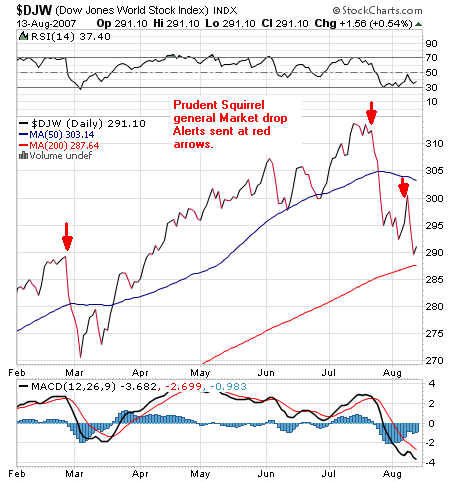Emerging Markets, Commodities and the US Dollar - Deleveraging
Stock-Markets / Credit Crunch Aug 15, 2007 - 12:07 AM GMTI just heard a Bloomberg interview with Dr. Marc Faber about the deleveraging in world markets. One of his main points was that, since 2003 about, many US investors moved significant percentages of their money into emerging markets and commodities. As the US economy sinks into recession, and deleveraging causes stock declines, there will be a lot of US money repatriated.
The implications of this are:
- A strengthening USD (or a force for that)
- Emerging market stocks will decline faster than US stocks (Faber)
- General deleveraging by hedge funds will cause overall stock declines
An interesting comment he made was ‘everybody is a hedge fund' because investors of all types, corporate finance arms, insurance companies, and so on, all are using high leverage and derivatives. So, what happens to the hedge fund world will happen in a much wider scope to the general financial community.
I suppose one can infer from this that the ever increasing losses from the US subprime world will cascade into financial realms one might not expect. I also expect many new forms of derivatives losses, and other complicated investment strategies to fail, such as the serious losses emerging in ‘Quant' funds, who make many transactions betting on small market differentials. The average Quant fund is down 15% in the last month, as markets have behaved unpredictably, and good and bad assets are liquidated regardless of quality in the emerging liquidity crisis. Quant funds are another fire brewing that will cause more forced market selling.
I just read an article that CitiGroup stated Monday that Prudential's exposure to the subprime situation is significant. This is just an example to show that, what has come to light in the subprime/mortgage derivatives market reveals what will emerge as losses all across the financial sector, not just at the banks and hedge funds that the news is focusing on.
My observation is that central banks will have more and more difficulty capping losses in upcoming liquidity crises. The reason is that the scope of derivatives losses, not only subprime, is killing many credit markets. One sector is corporate finance, where institutions are having trouble selling corporate paper for maturing loans.
We already know that the CDO and ABS (mortgage derivatives) markets have frozen, causing the Fed to have to buy over $30 billion worth of ABS (asset backed securities) from institutions at face value to prevent panic selling Friday.
This kind of action illustrates that the central banks may end up having to buy perhaps trillions of dollar value of every imaginable financial instrument at face value from institutions such as banks and funds, or else face the danger of panic selling that totally destroys the market value of these – as markets freeze and the only offers come from vulture funds offering 5 cents on the dollar (the Bear debacle). That kind of disastrous math is why the major central banks have had to pump an incredible $460 billion into markets Thursday and Friday, and the ECB another $60 plus billion worth on Monday.
But, not to get sidetracked, as deleveraging works its way through markets, and since ‘everybody is a hedge fund' US losses will accumulate, and as US money is repatriated, emerging markets and commodity markets will fall significantly, particularly considering the already serious forced deleveraging in practically all financial markets, regardless of US dollar repatriation.
Faber's comment on what to do about all this? “be patient and willing to just protect wealth not just make money at all times” (that is my paraphrase).

We at Prudent Squirrel have been on that exact refrain for months. We have sent out email alerts just before the world stock crashes starting February 27, and several days before the market crashes that commenced around the 24th of July, and Aug 7. (other alerts as well anticipating many stock and or metal drops in between.) The reason for these alerts is because we have been talking about getting more liquid much of this year.
By Christopher Laird
PrudentSquirrel.com
Chris Laird has been an Oracle systems engineer, database administrator, and math teacher. He has a BS in mathematics from UCLA and is a certified Oracle database administrator. He has been an avid follower of financial news since childhood. His father is Jere Laird, former business editor of KNX news AM 1070, Los Angeles (ret). He has grown up immersed in financial news. His Grandmother was Alice Widener, publisher of USA magazine in the 60's to 80's, a newsletter that covered many of the topics you find today at the preeminent gold sites. Chris is the publisher of the Prudent Squirrel newsletter, an economic and gold commentary.
Christopher Laird Archive |
© 2005-2022 http://www.MarketOracle.co.uk - The Market Oracle is a FREE Daily Financial Markets Analysis & Forecasting online publication.



